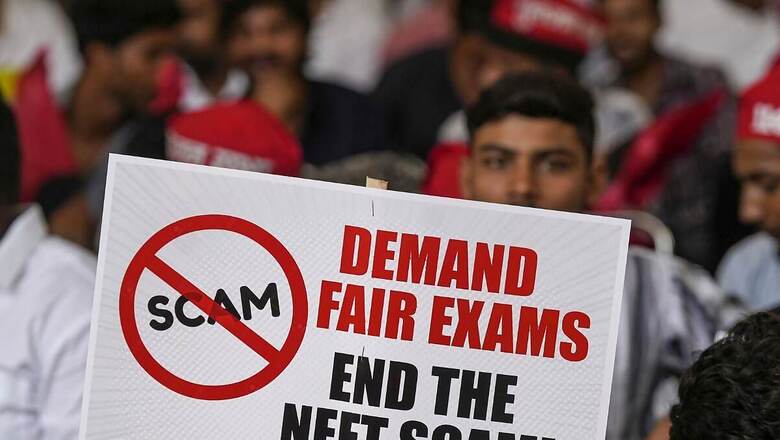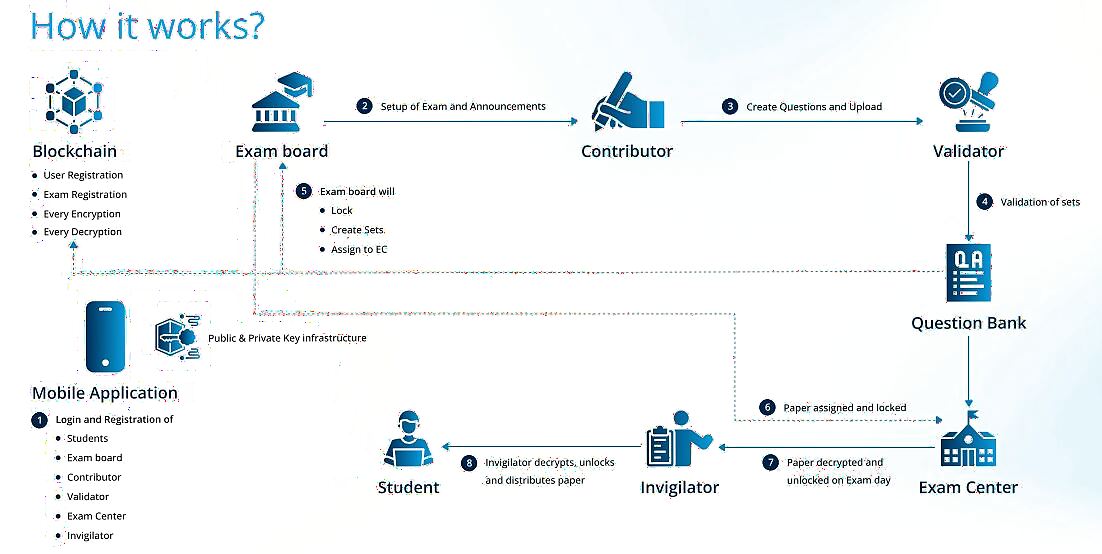
views
The NEET UG 2024 test was compromised by a paper leak, driving the CBI to arrest multiple school administrators, solver gangs, and others involved in acquiring and sharing exam papers with students over social media. Legal actions, including the Supreme Court’s involvement, aim to examine the impact and may result in a re-examination if the paper leak is found to be on a large scale. With more than 23 lakh participants affected, students and their families have upped their efforts to fight for justice. This issue has raised severe concerns about the integrity of such important exams carried out in the country, prompting requests for more stringent preventative measures.
Can blockchain technology prevent or help lower the alarming instances of paper leaks like NEET-UG and UGC-NET? Experts say it’s possible, especially when it comes to boosting transparency around the conduct of such competitive exams.
Some of the common sources of question paper leaks identified during CBI investigations into recent cases are internal corruption, hacking by cybercriminals, and theft of exam papers from storage facilities or during transportation. According to experts News18 spoke to, the blockchain system could be the way forward. They contend that while blockchain technology cannot guarantee a complete stop on paper leaks, it can ensure a fairer and smoother process by identifying the source of the leak.
How Will Blockchain Be Helpful In Conducting Exams?
According to EduBlock Pro Managing Director Vikram R Singh, blockchain tech’s promise lies in the removal of third parties or intermediates. “It ensures that all transactions and records are recorded securely within one platform. Candidates are made stakeholders within the value chain and the exam paper is locked until the candidate’s private key is applied, ensuring security,” he said. EduBlock is a registered education technology company that works to revolutionise exam management through innovative blockchain solutions.
Blockchain technology can help implement sequential encryption and real-time paper generation and printing, according to EduBlock Pro. This includes asymmetric signature encryption, sequential cryptography, multiparty computation, and randomised paper setter. “The NEET paper leak is a significant issue affecting many students’ careers. Blockchain technology can remove third-party interventions, allowing machines to handle the process securely and transparently,” Singh explained, adding that it works for online, offline, and hybrid exams.
The blockchain-powered platform EduBlockPro says its technology secures every step of the examination process, from creating questions to giving them over to students on exam day. The system allows for secure operations such as user and exam registration as well as exam paper encryption and decryption. The exam board is in charge of the test setup, announcement, and administration, which includes locking, creating question paper sets, and assigning exam centres.
The use of public and private key infrastructure allows safe interactions between students, contributors, and invigilators throughout paper decryption and distribution. Validators assure the accuracy of question sets, while test centres manage the handing over of the question paper after decryption on exam day. Once the student, administrator, and invigilator have entered their keys for the data package containing the questions, the question papers are printed out in real-time.

Ashutosh Bhatia, Associate Professor in the Department of Computer Science and Information Systems at BITS Pilani, explained that blockchain technology can help find the source of any paper leak. “Instead of directly stopping leaks, the implementation of blockchain technology in the process makes it fairer and leak-proof,” he said.
“The implementation of blockchain technology in the exam process makes it leak-proof by recording every event in the chain of examination, right from setting the question paper to the distribution, in a secure ledger so that no changes can be made. It further enables the traceable handover of exam papers in case of leaks, hence aiding investigative agencies in identifying and evaluating the extent of a local or global leak. Blockchain, therefore, ensures accountability and transparency in making a more robust and reliable examination system,” Bhatia told News18.
Educationist Praneet Mungali, trustee at Pune’s Sanskriti Group of Schools, concurred. “The architecture behind blockchain technology makes it nearly impossible to hack into it. This is why it is also referred to as an ‘immutable ledger’. The use of blockchain technology in securing any digital assets like question papers creates a much more robust digital landscape,” he said.
What Is Blockchain?
Blockchain is basically a decentralised digital ledger that uses cryptography to securely store and verify data across a network of computers. It’s made up of blocks of data that are linked together in a chain, with each block containing a timestamp, transaction data, and a cryptographic hash of the previous block.
The blocks are linked in a way that makes it difficult to alter or insert blocks, and each new block strengthens the verification of the previous blocks. This makes the blockchain immutable, or unalterable, and creates a consistent record of transactions that can be trusted by all network members.
The blockchain database can be shared across a network of computers. “Once a record has been added to the chain, it is very difficult to change. To ensure all the copies of the database are the same, the network makes constant checks. Blockchains have been used to underpin cyber-currencies like bitcoin, but many other possible uses are emerging,” according to a June 2018 Reuters report.
Conventional Tech Vs Blockchain
The current system relies on centralised servers and databases, making it susceptible to data breaches and manipulation, according to EduBlock Pro. It also depends on a centralised authority or server, thereby giving them control over the exam process and results, making the entire process vulnerable to manipulation.
Prof Vidhu Shekhar, Assistant Professor for Finance and Economics at SPJIMR, said that blockchain’s access control, secure storage, tamper-proof, and tamper-evident nature make it a good candidate for large-scale exam processes.
“Exam papers can be encrypted and stored on a blockchain, making unauthorised access difficult. Students can access exam papers using their private keys at exam time, or the exam centre head can use their private keys to print the papers at a specific time. The distribution of papers can also be tracked and recorded on the blockchain,” he explained.
Further, there are no significant challenges in implementing blockchain technology as it involves updating the current system. “The approach removes middle parties, designs question papers in a trestle fashion, and prints them in real-time, reducing operational complexities before and after the exam. For example, a proof-of-concept test conducted with the Government of Punjab involved 300 students and was conducted seamlessly, indicating scalability,” Singh told News18, adding that the cost of implementing the new system should not exceed current operational costs. The new tech will help eliminate paper transport and printing costs, he added.




















Comments
0 comment